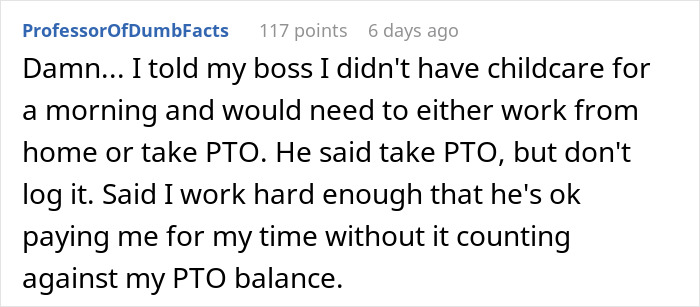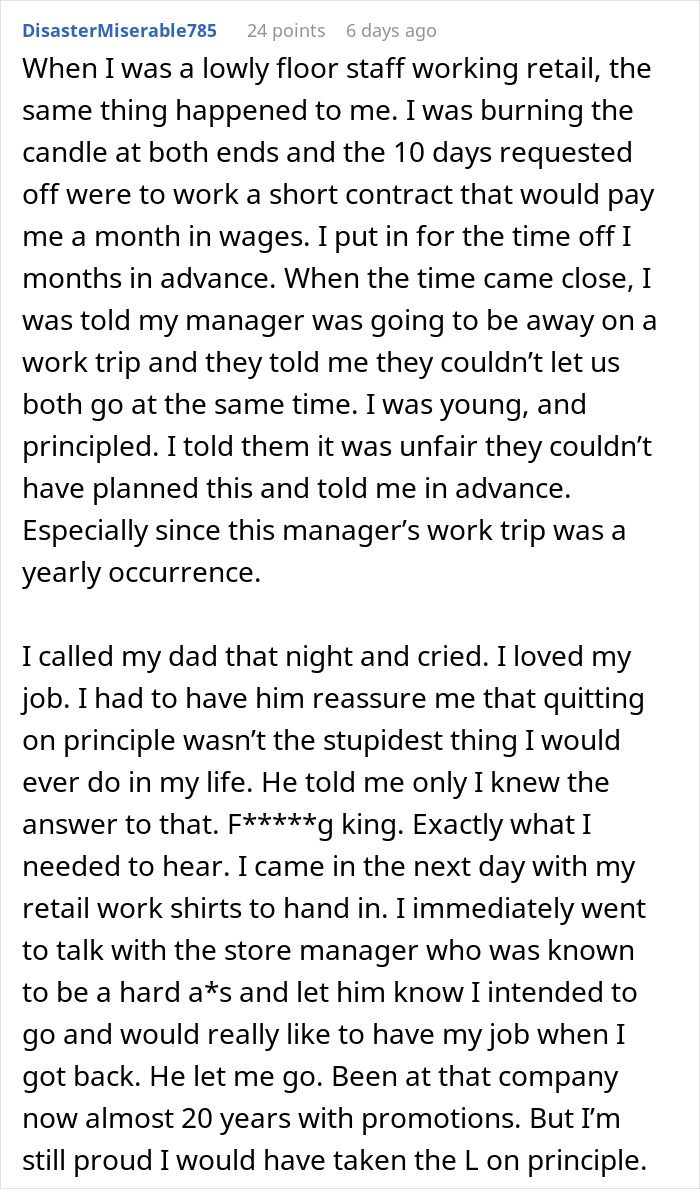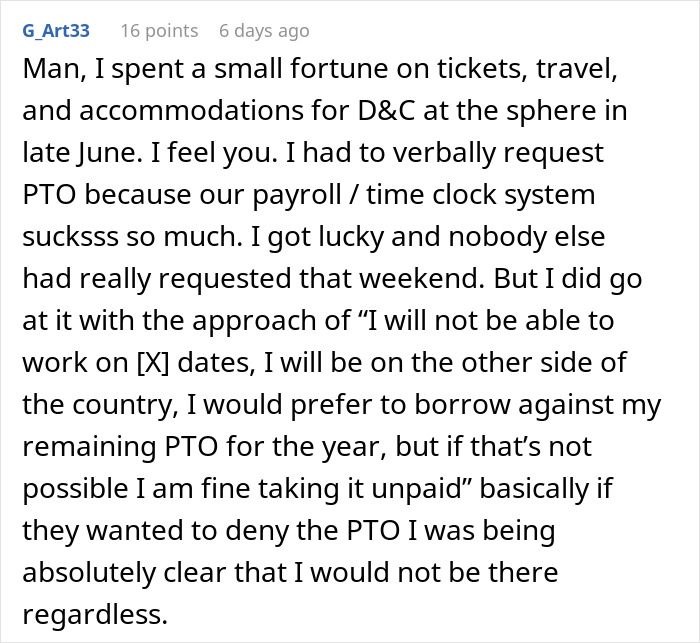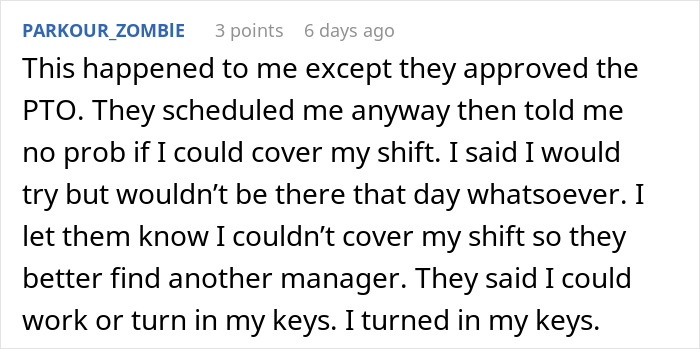Bosses need to understand that their staff need time to rest, recharge, and spend quality time with their loved ones to be able to do their jobs well. If the only thing their employees have to look forward to is more work, that’s only going to demotivate them. Not only is that awful for everyone’s morale, but it’s also going to affect the company’s bottom line.
One redditor recently went viral online after sharing how management verbally approved his request for paid time off to go to a concert with his family and then went back on that promise. Read on for the full story.
Bored Panda got in touch with the author, and he was happy to tell us a bit more about what happened, and he gave us an update about the concert.
One of the most frustrating workplace experiences is having your request for paid time off rejected for a random reason

Image credits: LightFieldStudios / Envato (not the actual photo)
One employee turned to the internet for advice after management verbally approved his time off, only to change course
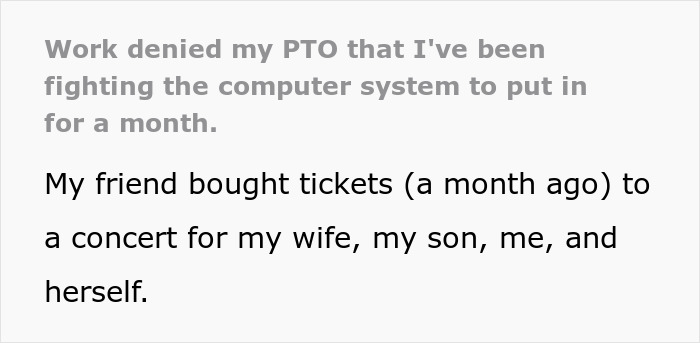

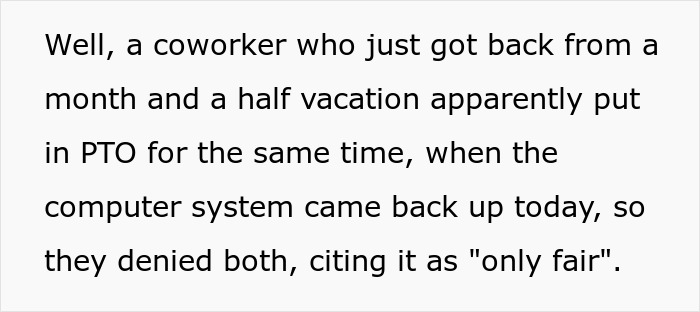

He later shared some additional info in the comments of his post
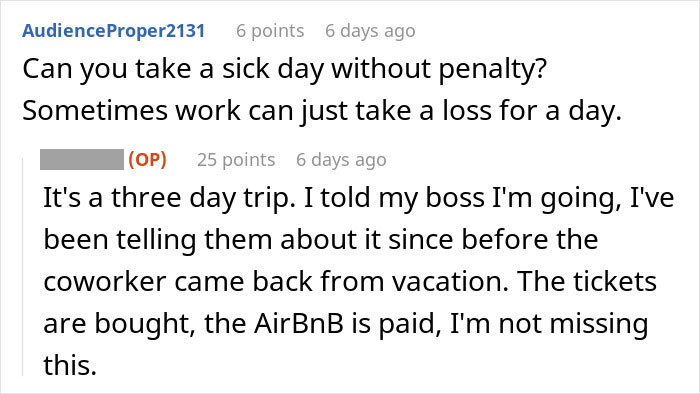





The story went viral, and lots of internet users gave the author some advice on what to do next




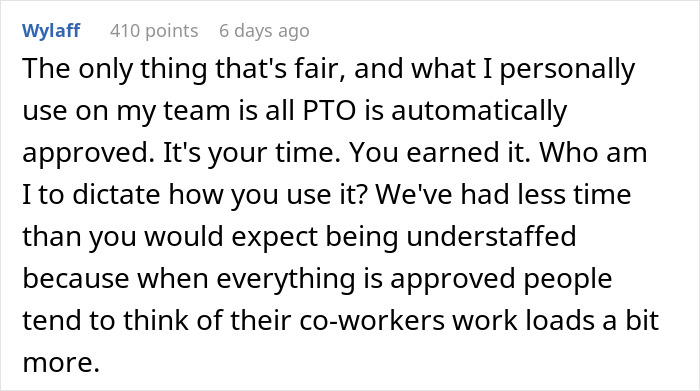
After reading everyone’s advice, the employee later posted a few updates on his plans

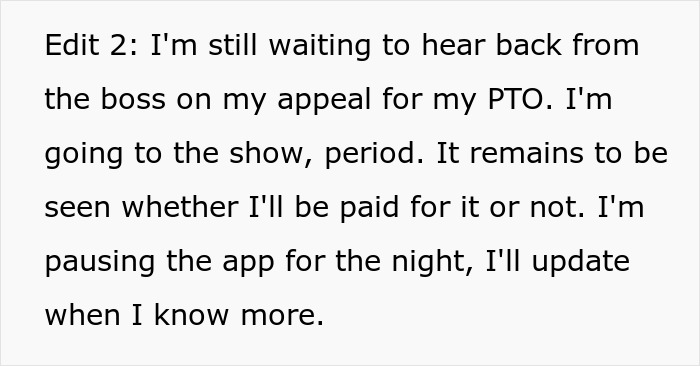
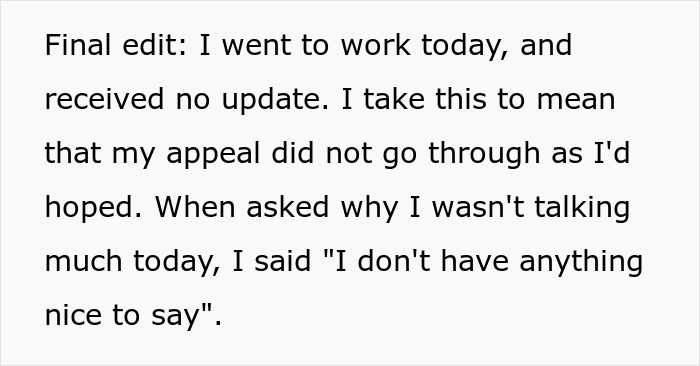

Image credits: zamrznutitonovi / Envato (not the actual photo)
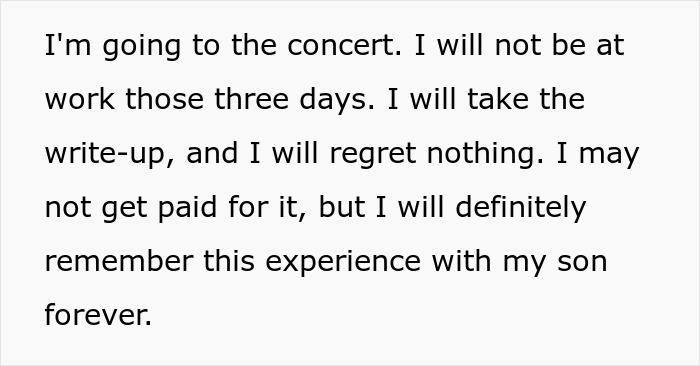

Burnout is a very common workplace problem, so it’s vital to be on the lookout for the symptoms

Image credits: Andrea Piacquadio / Pexels (not the actual photo)
Deep rest and time off are absolutely essential if you want your staff to be motivated, efficient, and capable. On the flip side, someone who’s overworked and burnt out is not going to do as well at their job, and they might start looking for a job with a better workplace culture. And finding replacements for talented specialists is incredibly costly and time-consuming.
A survey conducted by Deloitte found that 77% of American workers have experienced burnout at their jobs, while half admitted that this has happened more than once.
Psychologist Christina Maslach, from the University of California, Berkeley, found that burnout has three components: physical and emotional exhaustion, cynicism, and inefficacy.
Employees who are exhausted are likely to feel frustrated and irritable, and they will struggle to enforce healthy boundaries at work and in other parts of their lives. They also find it difficult to feel positive about their tasks at work. This is usually how burnout starts, but for some employees, other symptoms appear in tandem with physical and emotional exhaustion.
These same employees might find themselves growing more cynical and less engaged at work. In short, they want to distance themselves from their jobs, whether they’re dealing with unfair workloads, unclear expectations, lack of feedback, constant conflict with their colleagues, etc.
This then leads to inefficacy, where the staff feel like they’re incompetent. They blame themselves when they notice that their skills aren’t as sharp anymore.
It’s an awful feeling when you have to compete for time off with your colleagues. The author of the post shared that his verbal request for time off was rejected after his coworker, who just got back from a month and a half of vacation, put in the same dates for PTO as him.
Instead of confirming the author’s request (which was already promised), management decided to deny time off for both employees. In the interest of ‘fairness,’ of course. However, what’s fair about a decision like this eludes us and many other internet users.
According to the author, he still planned to take the days off, no matter what. He wanted to spend the time at a concert with his loved ones. For him, his family is a priority.
The employee still went to the concert with his family, and they had a fantastic time there

Image credits: picjumbo.com / Pexels (not the actual photo)
The author, who preferred to remain anonymous, confirmed to Bored Panda that he was, in fact, able to go to the concert by indie pop band AJR with his family. Which is awesome news! Coincidentally, we got in touch with him “not a full hour” after the concert ended.
“It was amazing. AJR brings such an amazing vibe to their shows, and that shows so strongly in the fans. Courteous, polite, and generally well-mannered folks through the entire 12k+. My son had the most fun! I’ve never seen him lose his [stuff] like that before!” he opened up about the experience with us.
We were curious to get the OP’s thoughts on why he thinks management rejected his PTO request in the first place.
“I think the management above my local station reacted to data on a screen, and that is what screwed me. I think that same upper management is just ‘manager attitude’ enough that he would stick to his answer regardless of circumstances,” he told Bored Panda.
“I think that 100% invalidated any verbal standing from a lower position than them.”
He also had some spot-on advice for anyone new to the job market. “If you can’t laugh while you’re doing what you’re doing, you’re either doing it wrong, or you shouldn’t be doing it in the first place,” he shared a good way to gauge whether you’re in the right line of work and at a good company.
The OP didn’t expect his story to get so much attention online. “I was honestly just grumpy at how things went,” he opened up to us.
In his opinion, the story really resonated with so many people due to the current state of employment in the United States. “With the cost of living rising like it is, it puts the people with the money in a higher position of power over those who need the money. It’s not healthy for anyone. It breeds bad habits in employers and trauma in employees,” he said.
Good managers put in the effort to support their staff however they can

Image credits: Andrea Piacquadio / Pexels (not the actual photo)
There are a lot of things that managers can do to support and motivate their employees. Business Psychologist Lee Chambers explained to Bored Panda in a previous interview that there is a lot of power in managers showing recognition and appreciation for their employees. This can be done formally or informally, as well as for big or small contributions.
“Flexibility is an increasingly important factor, so flexible working policies can promote trust and balance. Supporting your people to find meaning in their work can be beneficial, as can providing relevant training and upskilling,” Chambers told us earlier.
“Clear communication is valued, and the ability to feel included through feedback and input can increase motivation, and access to wellbeing can promote positive engagement in other aspects of work,” he said.
“Setting and communicating realistic boundaries creates space to work efficiently, prioritizes tasks, ensures urgent and important tasks get the attention and progress needed, and allows space for regular breaks and less overtime,” Chambers told Bored Panda.
“Time management techniques can be effective for some people to give structure, and this also opens opportunities for flexibility in other areas. Minimizing distraction can improve output and provide more time for personal commitments and practicing self-care, leaving you with a balance that won’t be perfect, but it will leave you with the opportunity to perform well both at work and outside of it.”
Some readers had similar PTO and work stories of their own to share

